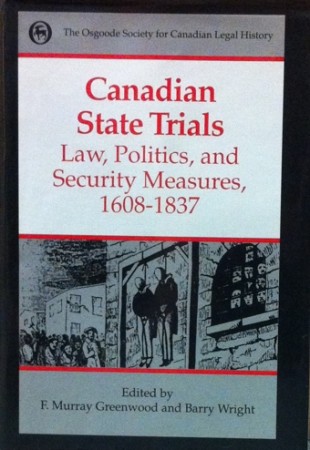edited by F. Murray Greenwood, Emeritus Professor of History, University of British Columbia and Barry Wright, Professor, Department of Law, Carleton University. Published with the University of Toronto Press, 1996.
State trials reveal much about a nation’s insecurities and shed light on important themes in political, constitutional, and legal history. In Canada, perceived and real threats to the state have ranged from dissent, disaffection, and the emergence of threatening ideologies to insurrection, riot, violent protest and military invasion. The Canadian State Trials series will explore the role of the law in regulating such threats, from the period of early European settlement to 1971. The first volume, and the planned series as a whole, present a great deal of new material by prominent Canadian historians and legal scholars. Although certain Canadian political trials and security crises have received scholarly attention in the past, there has never been a comprehensive and systematic examination of the country’s surprisingly rich record in this area. The eighteen essays in Volume I examine this record for the period 1608-1837, covering proceedings in New France, the four Atlantic colonies, the old province of Quebec, and the two Canadas. They highlight security law during the American revolution, the wars against revolutionary/Napoleonic France, and the War of 1812; comparative treason law; and the trials of David McLane, Robert Gourlay, Francis Collins, and Joseph Howe, among others. The essays, which make extensive use of primary sources ( the most illuminating of which appear in a documentary appendix), place the examination of the law and its administration during these events in socio-political and comparative context.


